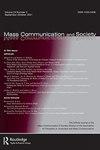“看看他们有多腐败!”:政治家的反政治话语如何影响其自身形象和政治形象
IF 2.7
2区 文学
Q1 COMMUNICATION
引用次数: 0
摘要
摘要本文采用调查实验(N = 1626)来检验政治家在Facebook上发布的反政治信息是否在损害政治形象的同时提高了对信息发布者的性格评价。我们考虑到人们先前存在的反政治态度和他们对政治信使的支持作为重要的版主。结果表明,政治家的反政治话语对受众对信使和政治态度的影响微乎其微。我们发现对三个潜在机制的支持有限:反政治信息给(一些)受众新的印象,改善了信使的个人形象(印象形成),政治家的反政治话语疏远了他们的一些支持者(反弹效应),反政治话语对不持有反政治态度的人有更大的影响(态度不一致)。总体而言,我们的研究结果表明,政治家从使用反政治话语中获益甚微,因为这种话语可能会恶化他们自己的形象和某些受众的政治形象。免责声明作为对作者和研究人员的服务,我们提供了这个版本的已接受的手稿(AM)。在最终出版版本记录(VoR)之前,将对该手稿进行编辑、排版和审查。在制作和印前,可能会发现可能影响内容的错误,所有适用于期刊的法律免责声明也与这些版本有关。披露声明我们没有已知的利益冲突需要披露。注1:受支持政党的参与者阅读的Facebook信息来自:Vlaams Belang(15.8%的参与者;弗拉芒民粹主义极右翼政党),新弗吉尼亚党(12.7%);佛兰德民族主义党),开放自由党(12.7%;自由党),基民盟(13.4%);基督教民主党(Christian democratic party),自由党(sp.a . /Vooruit) (11.4%;社会党),绿党(14.1%);绿党),或者自由党(7.3%);工人党)。接触到不受欢迎政党的参与者会在Facebook上阅读以下政党的信息:弗拉门斯党(39.1%)、N-VA(10.6%)、Open Vld(6.3%)、CD&V(4.2%)、sp.a/Vooruit(11.2%)、Groen(10.4%)或PVDA (18.1%)我们使用R中的“lavaan”包(Rosseel, Citation2012)。所有模型均采用WLSMV估计进行估计我们对中介分析的解释假设考虑了所有相关机制。这个假设是试探性的,因为(a)在中介分析中可能没有考虑到一些重要的变量,(b)没有直接观察到将中介与结果变量联系起来的因果(认知)机制。有关因果分析中未观察到的变量偏差(或混杂因素)问题的完整讨论,请参见Imai等人(Citation2011)。作者简介dieter Dekeyser拥有犯罪学(2012年)、社会学(2014年)和统计学(2015年)硕士学位,并于2022年在比利时根特大学获得社会学博士学位。他的研究兴趣包括民粹主义、政治态度、媒体效应、民意研究、认知社会学和研究方法论。罗斯在比利时根特大学获得社会学博士学位。现为副教授,教授方法论与文化社会学课程。他的研究重点是利用几何数据分析、审美倾向的实证分析和调查方法,研究文化参与与社会分层之间的联系。本文章由计算机程序翻译,如有差异,请以英文原文为准。
‘Look at How Corrupt They Are!’: How Anti-Political Discourse from Politicians Affects Their Own Image and the Image of Politics
ABSTRACTIn this article, we use a survey experiment (N = 1,626) to test whether anti-political Facebook messages from politicians improve the character evaluation of the messenger while damaging the image of politics. We take account of people’s preexisting anti-political attitudes and their support for the political messenger as important moderators. Results show that anti-political discourse from politicians has minimal effects on the attitudes of audiences toward the messenger and toward politics. We find limited support for three underlying mechanisms: anti-political messages give (some) audiences new impressions that improve the personal image of the messenger (impression formation), anti-political discourse from politicians alienates some of their supporters (backlash effect), and anti-political discourse has more effect on people who do not hold anti-political attitudes (attitudinal incongruence). Overall, our results show that politicians reap little benefit from using anti-political discourse, as such discourse may worsen their own image and the image of politics among certain audiences.DisclaimerAs a service to authors and researchers we are providing this version of an accepted manuscript (AM). Copyediting, typesetting, and review of the resulting proofs will be undertaken on this manuscript before final publication of the Version of Record (VoR). During production and pre-press, errors may be discovered which could affect the content, and all legal disclaimers that apply to the journal relate to these versions also. Disclosure StatementWe have no known conflict of interest to disclose.Notes1 Participants exposed to a favored political party read a Facebook message from: Vlaams Belang (15.8% of participants; the Flemish populist radical-right party), N-VA (12.7%; Flemish nationalist party), Open Vld (12.7%; the liberal party), CD&V (13.4%; Christian democratic party), sp.a/Vooruit (11.4%; the socialist party), Groen (14.1%; the green party), or PVDA (7.3%; the workers’ party). Participants exposed to an unfavored political party read a Facebook message from: Vlaams Belang (39.1%%), N-VA (10.6%), Open Vld (6.3%), CD&V (4.2%), sp.a/Vooruit (11.2%), Groen (10.4%), or PVDA (18.1%)..2 We use the package “lavaan” in R (Rosseel, Citation2012). All models were estimated using WLSMV estimation.3 Our interpretation of the mediation analysis assumes that all relevant mechanisms are considered. This assumption is tentative given that (a) some important variables might not have been considered in the mediation analysis and (b) the causal (cognitive) mechanisms linking the mediator to the outcome variable(s) were not directly observed. For a full discussion on the problem of unobserved variable bias (or confounders) in causal analysis see Imai et al. (Citation2011).Additional informationNotes on contributorsDieter DekeyserDieter Dekeyser holds master’s degrees in criminology (2012), sociology (2014), and statistics (2015), and received his PhD in sociology at Ghent University (Belgium) in 2022. His research interests include populism, political attitudes, media effects, public opinion research, cognitive sociology, and research methodology.Henk RooseHenk Roose received his PhD in sociology at Ghent University (Belgium). He is currently working there as an associate professor teaching Methodology and Cultural Sociology. His research focuses on the link between cultural participation and social stratification using Geometric Data Analysis, the empirical analysis of aesthetic dispositions and survey methods.
求助全文
通过发布文献求助,成功后即可免费获取论文全文。
去求助
来源期刊

Mass Communication and Society
COMMUNICATION-
CiteScore
6.90
自引率
3.30%
发文量
58
期刊介绍:
Mass Communication and Society" mission is to publish articles from a wide variety of perspectives and approaches that advance mass communication theory, especially at the societal or macrosocial level. It draws heavily from many other disciplines, including sociology, psychology, anthropology, philosophy, law, and history. Methodologically, journal articles employ qualitative and quantitative methods, survey research, ethnography, laboratory experiments, historical methods, and legal analysis.
 求助内容:
求助内容: 应助结果提醒方式:
应助结果提醒方式:


